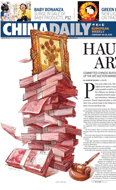Op-Ed Contributors
China should be judged properly
Updated: 2011-02-21 07:35
By Fu Jing (China Daily)
Germany hopes for G20 deal despite Chinese opposition. China resisting G20 deal on indicators. China blocking G20 agreement on indicators. These are some of the headlines that flashed across the Western media during the weekend.
While the G20 finance ministers and central bank governors were at a close-door meeting on Saturday to set yardsticks to measure global imbalance, Western journalists were playing up the partial disagreement between China and other countries.
After using words such as "opposition, resisting and blocking", Western journalists could jolly well say "China hijacks " to once again make it the scapegoat if no agreement or compromise is reached on the issue. For a precedent, one has to see what The Guardian did at the Copenhagen climate change conference in 2009.
The G20 negotiators were testing journalists' patience, but that happens at almost every meeting of international leaders. But this time, the U-turn came faster: Only a couple of hours after the misleading headlines were flashed, French Finance Minister Christine Lagarde announced that the participants had agreed on five basic yardsticks after a "fruitful night" of negotiations.
Objectivity should be the guiding principle of journalists. Misusing a country's partial difference to say it is "opposing, resisting or blocking" a deal is not only unfair, but also can mislead the public.
The Western media has long ignored China's basic situation: The country is home to 1.3 billion people. Hence, at the two-day meeting, Finance Minister Xie Xuren and Central Bank Governor Zhou Xiaochuan were speaking on behalf of nearly one-fifth of the world's population.
If one bears this in mind, it would be easier to understand Chinese negotiators, especially when they face difficulty in finding converging points of national interests and global agenda.
Foreign reserves, currency and trade issues are no small decisions for a country such as China to take. It is unrealistic to expect the world's largest developing country to make changes overnight, for it cannot afford to commit a big mistake with such decisions. But China is a pragmatic country, and at many international meetings, it has shown flexibility and cooperative spirit, such as at the G20 meeting on Saturday.
Coincidently, when the G20 meeting was organized in Paris on Saturday, Beijing held a high-profile seminar on social management, which was attended by the country's top leaders, including President Hu Jintao and Premier Wen Jiabao.
The profound implication of the two separate meetings in Paris and Beijing is that China will assess social impacts first while considering any policy shift. It can bring unnecessary domestic and social pressures if it does not make a proper decision on trade, foreign reserves and other issues on the global stage.
The Western media should understand the complexity when China takes some time to make a decision on an international issue. Taking time to make a decision does not mean China is unwilling to fulfill its international obligations.
In fact, China has extended a hand whenever another country or the rest of the world has been in trouble. During the global financial crisis, China continued signing multi-billion-dollar deals with other countries. But few Western media outlets have appreciated that.
The G20, under French presidency, has set the right agenda for rebalancing the global economy and ensuring a fair and effective monetary and financial regime. China has responded by agreeing to contribute to the global efforts. Next month, China's sincerity can be seen in a new five-year economic and social development program, which will be approved by the National People's Congress. Encouraging policies include doubling imports within five years and boosting investment overseas.
These actions, for sure, will be accompanied by China's active participation in perfecting the rules of the global game. China has realized that global participation should not be one-party-wins or a zero-sum deal, and knows how to achieve win-win situation.
During the G20 meeting in Paris, the international community and the Western media might not have been satisfied with China's stance on revaluation and internationalization of the yuan, and many leaders might have urged it to take faster action. But China has good reason not to have acted according to the West's demands.
For example, if Beijing takes radical measures to revaluate the yuan, countries exporting goods to China will be unhappy when it implements its new import policy later this year.
So, when reporting about China, Western journalists should be more objective and insightful.
The author is China Daily's chief correspondent in Brussels.
(China Daily 02/21/2011 page8)
E-paper

Online shops boom in China
Low investment, quick returns offer profit-making opportunities for struggling students.
Something 'fishy' about this trick
Banking on success
Branded outlets move in
Specials

The green lantern
Environmental concerns are shedding new light on a colorful tradition

Inland interchange
Chongqing bets on its position as a hub for China's west.

Zooming in on Chinese skies
Helicopter companies ride on country's growing interest in luxury aviation.
